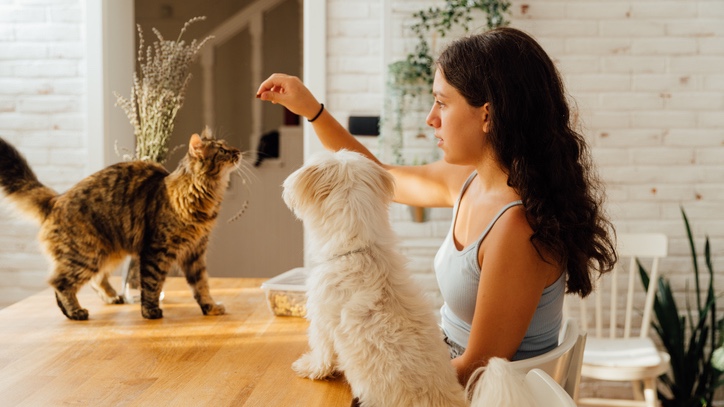Can dogs eat cat treats? Everything you need to know
Our expert vet addresses the question: can dogs eat cat treats? And the answer may surprise you

Some pooches will eat anything but, in reality, can dogs eat cat treats? It’s easy to see why there would be a temptation to give dog food fit for a kitty – sometimes the cupboard is bare, your pup is hungry and there’s a big stash of cat food waiting to be scoffed. But is dishing out those treats actually safe and is there any nutritional value to be had?
Here we’re going to explore that very topic, with expert advice from vet Dr Joanna Woodnutt. In the course of coming up with an answer, we’ll look at the differences between cat and dog treats and any steps you might want to take if you’re tempted to hand out the best cat treats. We’re also going to look at what the consequences might be if your dog had inadvertently eaten some and the ingredients that you should avoid.
Of course, none of this would be an issue if you stocked up with the best dog treats or even made use of 12 natural treats for dogs you can feel from your kitchen. It’s also worth grabbing hold of the longest lasting dog chews so that you know your pooch can always have something to get their teeth around. But given how adventurous dogs can be, that may not entirely satisfy. So let’s see what Dr Woodnutt had to say.
Dr Joanna Woodnutt graduated from the University of Nottingham in 2016 with a degree in veterinary science. Shortly after, Dr Woodnutt went to practice companion animal medicine in the Midlands, UK. She quickly developed a love of consulting and helping clients with medical problems such as dermatology, behavior and nutrition.
What is the difference between dog treats and cat treats?
There are certain treats that you will only find marketed for the consumption of dogs: dog chews, dried natural treats, and bones. There’s a reason for this. Dogs are natural chewers but cats are not, which is why they don’t have an equivalent. Instead, cats tend to eat freshly killed prey of a small enough size that their teeth can quickly crunch through bones. Dogs, meanwhile, tend to prefer long, chewable stick-like treats rather than something that can be eaten quickly.
But there is a type of treat that is similar for both cats and dogs. And that is a dog training treat – something which is similar in size and content to the best cat treats. They’re often meat-based, although many lower cost brands will include plant materials and grains to produce a kibble-like treat. The main difference is that cat treats are slightly more likely to contain chicken and fish rather than beef and lamb, and they’re also often smellier than dog treats. Dog treats are usually larger than cat treats and may contain more calories per treat.
Can dogs and cats eat the same treats?
Given what we’ve just said, you can assume that, yes, dogs can eat cat treats. The same, however, isn’t true the other way around. A one-off dog treat given to a cat is unlikely to harm but dog treats can sometimes contain small amounts of ingredients that are toxic to cats. They might contain ethylene glycol, onion, or garlic. These treats will have been manufactured to be safe for dogs and tested thoroughly – but they won’t have been tested on cats.
Do I need to be wary when feeding cat treats to a dog?
There are a few basic rules you need to apply to safely feed cat treats to your pooch:
Get the best advice, tips and top tech for your beloved Pets
1. Don’t make a habit of it!
It’s not a good idea to feed cat treats to your dog daily. After all, they are different species with different nutritional needs. Cat treats are often too small to be interesting to most dogs – many will be happier with one of the longest lasting dog chews.
2. Stick to the 10% rule
Treats, whether dog or cat, are nutritionally incomplete – they don’t contain all the nutrients required to thrive. This means that, alongside other incomplete sources, they should never make up more than 10% of your pet’s daily calorie allowance. When you’re working out how many cat treats your dog can have, look at their total daily calorie allowance, then find 10%. Now, take off calories for any table scraps, dog treats, dental chews, or other snacks they get. What’s left is how many calories they can have in cat treats – and it’s probably not many!
3. Check the ingredients
It’s a good idea to check the ingredients list for red flags before feeding anything to your pet. Although cat treats are unlikely to contain ingredients that are toxic to dogs, they can be extremely high in fat, which may cause pancreatitis in susceptible dogs.
Can dogs eat catnip?

Some cat treats contain catnip but is catnip for dogs safe? Again, the answer is yes and, the bonus is that dogs don’t have the same reaction to catnip as cats so you don’t need to worry about sending your pooch wild. This means you needn’t call a vet if your dog has eaten catnip from the garden, dried catnip, or a catnip treat. Nor, for that matter, should you panic if a dog has eaten one of the best catnip toys.
What happens if my dog eats cat treats?
Giving dogs cat treats only becomes a problem if you give a pooch too many. Cat treats are often higher in fat than dog treats and over-consumption can cause pancreatitis. You may, however, still want to monitor your dog at home after they have eaten cat treats. Look out for signs of stomach upset, including abdominal pain, vomiting, and diarrhea, and call your vet if you become worried about your dog at any time.
So, can dogs eat cat treats?
Cat treats are generally safe for dogs to eat, but dog treats are not always safe for cats. It’s fine to feed your dog the occasional cat treat as a reward if they enjoy them but make sure you aren’t feeding them too many, or you could cause pancreatitis, obesity, or a nutritional deficiency.
After graduating as a vet from the University of Nottingham in 2016, Dr. Joanna Woodnutt went on to practice companion animal medicine in the Midlands. She quickly developed a love of consulting and helping clients with medical problems such as dermatology, behavior and nutrition - anything that involved helping clients understand their pets better.
Jo started writing about pet health in 2017, realizing that it meant she could help even more pet parents. Since then, she has written for countless online and print publications and is a regular contributor for Edition Dog Magazine. Jo is the director of The Veterinary Content Company, which she founded in 2020. She is also the founder of Petlearnia, a platform that provides pet e-learning courses for pet parents.
Jo now lives in the Channel Islands with her husband Ian and terrier Pixie.

